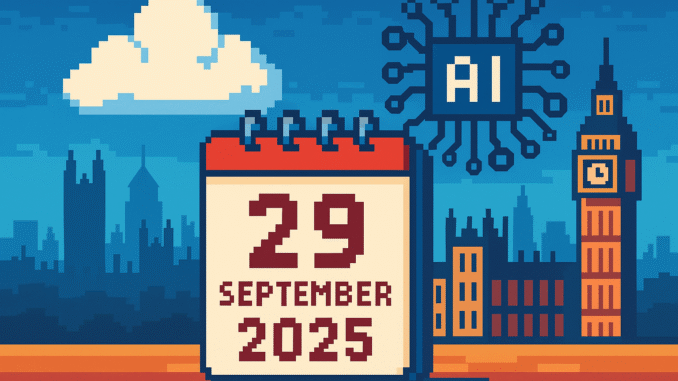
Microsoft is pouring £24 billion of new cash into the UK, Tim Berners-Lee is looking back with pride and a little frustration, and the “ad-free” social web now comes at a literal price. Tech Brief 29 September 2025 brings you today’s headlines as they collide with three decades of shifting tech expectations. Missed yesterday’s Tech Brief? Catch up here before diving in.
Britain’s Digital Sovereignty Debated as US Tech Investment Soars
“Is this the end of British tech independence?” That’s the question making the rounds as US companies announce over £160 billion ($200 billion) in UK tech investment, including a record £24 billion pledge from Microsoft. Nick Clegg, former Deputy PM now turned Silicon Valley operator, labels the situation a “kind of vassal state technologically,” a phrase you don’t often see outside GCSE history textbooks.
The stakes go beyond headlines and conference speeches. Critics warn of growing UK reliance on foreign cloud and AI providers, especially as European neighbours like Germany and Denmark pursue local alternatives. If Silicon Valley holds the keys to our cloud infrastructure, who gets to decide what runs and what stays in the digital heart of Britain?
There are no easy answers. For many, this is more than a corporate or political battle; it touches on memories of when kit culture was home-grown, designed in Cambridge, not California. Are we heading for new tech prosperity, or just deeper into the rental economy?
Tim Berners-Lee: Why the Web Stayed Free
There are not many chances to hear the inventor of the World Wide Web reflect on what might have been. Tim Berners-Lee tells The Guardian why, at just 34, he handed over the central technology of the modern era for nothing. No patent, no licence fee, no complicated contracts for every new browser.
CERN staff described his proposal as “a little eccentric” and maybe that’s what saved the web from turning into yet another walled garden. He wrote out the first concepts in snow with a ski pole. The point wasn’t profit, but accessibility and shared possibility. Berners-Lee says those principles are still at risk, threatened by corporate paywalls and exploitation.
Anyone who’s ever swapped code on coverdisks or pored over new tech developments in computer magazines or bulletin boards knows the difference between open and closed isn’t just technical. It’s cultural. Berners-Lee’s choice still shapes digital life, even as platforms drift toward profit over principle.
Meta’s £3.99 Ad-Free Offer Opens Privacy Debate
A single sentence says plenty: Facebook and Instagram now cost £3.99 a month if you want to skip adverts. Meta’s move follows new UK privacy rules, targeting users tired of endless tracking and personalisation. For years, the social web promised “free” access, paid for with attention and data. Now, privacy gets a price tag. It’s a remarkable reversal. The once-default digital public square now splits between those who pay and those who tolerate tracking.
Regulatory pressure is partly responsible, but let’s be honest, the tide was turning long ago. Discussions about online privacy and data use have outpaced most users’ patience. For anyone who remembers dial-up days, the latest subscription tier hints at an uncomfortable future where every layer of the web is up for sale, from messaging to basic curiosity.
Nothing is ever truly free on the internet, but this new price tag will make many question if what’s left is worth the fee. Is charging for the absence of adverts real progress, or just an expensive way to feel left alone?
Anthropic Expands AI Workforce Across Borders
Anthropic, the AI company behind Claude, plans to triple its global workforce outside the US by next year. The company’s rapid hiring aims to bring Claude AI models to more countries and industries, staking a claim as the next big alternative to OpenAI’s ChatGPT. But will new faces and more offices deliver the leap users expect?
Nobody is promising a “British Claude,” but the hunger for competition in AI feels much like the early browser battles. The infrastructure now is cloud and learning models, not compact code on floppies. There is no nostalgia here, only a brisk demand for something better, faster, or simply open to more users.
The stakes are growing. If British digital sovereignty is at risk from US giants, as above, the rise of foreign AI challengers is more than a headline. It’s a shift in who gets to define what computers mean in everyday life.
From the Wayback Machine
On This Day: 1994 – Sun Microsystems engineers unveiled the HotJava browser prototype, showcasing Java applets on the web. James Gosling’s team built the first browser to run interactive Java programmes inside web pages, not just display static text and images. Early HotJava was slow but introduced the foundations of the cross-platform, programmable web we now take for granted. Applets faded, but this demo proved the web could host more than HTML. Browsers like Navigator soon adjusted course, steering the future toward client-side scripting and plug-ins. Looking back, HotJava reminds us that innovation is often messy, sometimes just a prototype that nudges the world to try a little harder.
What This Means
Digital sovereignty, creative generosity, and the open web all feel oddly fragile again in Tech Brief 29 September 2025. Does a £3.99 subscription, an open protocol, or a home-grown AI define our future? Maybe, but nostalgia alone won’t steer the next breakthrough.
Let’s not let tech’s future be just something that happens to us; get curious, be noisy, and keep rescuing those old machines.
Missed yesterday’s Tech Brief? Catch up here

Leave a Reply